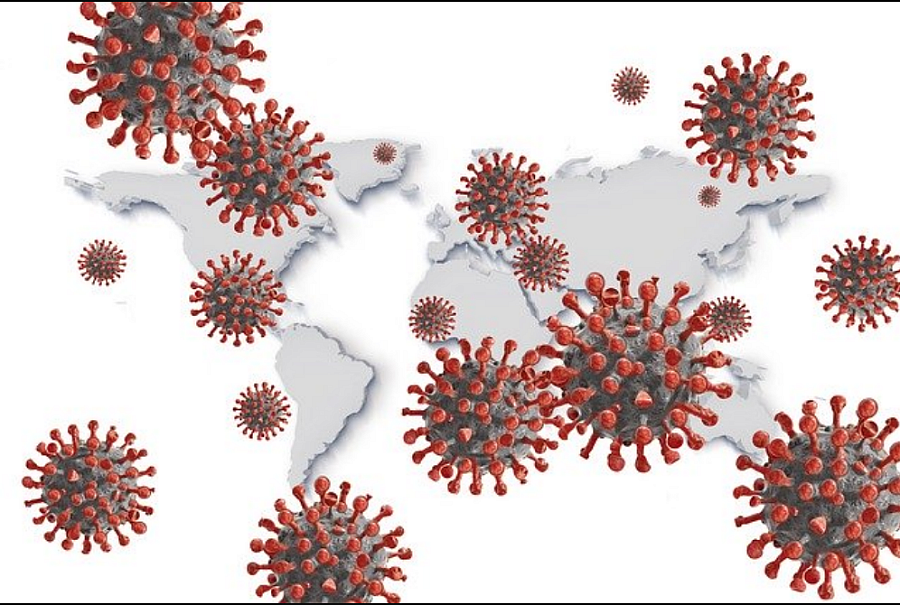Coronavirus Files: Moderna vaccine gets FDA approval


Health Divide: Inequity continues to plague the pandemic
Social distancing, constant hand-washing, and mask wearing are nothing new to many people with rare diseases such as cystic fibrosis. As COVID-19 swept across the nation, many families with chronically ill members suddenly found themselves scrambling to secure everyday necessities that were now in high demand and in short supply. Shortages of personal protective equipment in particular have become a constant challenge as the pandemic surges toward 2021. “Even for those who are able to stay home, the lack of PPE complicates day-to-day life for people with rare diseases,” writes Anna Goshua for STAT. “They don’t just need adequate PPE for themselves — anyone they live with or visit who goes out and potentially exposes themselves to the coronavirus needs to be wearing it to decrease the risk of transmitting an infection.”
As wealthier nations look toward a possible end to the pandemic in the months to come, thanks to newly approved vaccines from Pfizer and Moderna, the road ahead is far less certain for poorer countries. “The ambitious initiative known as COVAX, created to ensure the entire world has access to COVID-19 vaccines, has secured only a fraction of the 2 billion doses it hopes to buy over the next year, has yet to confirm any actual deals to ship out vaccines and is short on cash,” write Maria Cheng and Aniruddha Ghosal of the Associated Press. The COVAX alliance has an agreement for only 200 million doses of the AstraZeneca and Novovax vaccines, which haven’t been licensed by any regulatory agency yet. “With vaccine supplies currently limited, developed countries, some of which helped fund the research with taxpayer money, are under tremendous pressure to protect their own populations and are buying up shots,” AP reports. “Meanwhile, some poorer countries that signed up to the initiative are looking for alternatives because of fears it won’t deliver.”
FDA panel authorizes Moderna vaccine
The U.S. Food and Drug Administration handed down emergency authorization for the Moderna COVID-19 vaccine late Friday, after a panel of outside advisors voted 20 to 0 (with one abstention) in favor on Thursday. That means Moderna will join Pfizer in vaccinating millions of Americans in the upcoming months, with front-line health care workers already starting to receive shots this week. “In a report ahead of the meeting, FDA staff determined Moderna’s vaccine is 94.1% effective against symptomatic Covid-19,” writes Anna Edney of Bloomberg. The report also discussed allergic reactions experienced by a few Pfizer vaccine recipients, which have prompted Pfizer and the FDA to revise fact sheets handed out with the vaccine. “The FDA found no severe allergic reactions in Moderna’s data but flagged a slightly higher rate of less serious side effects — rash, hives, itching — among participants who got the vaccine, compared with those receiving a dummy shot,” the AP reports.
States told to expect fewer doses, while Pfizer reports millions of doses sitting in warehouse.
Pfizer began its vaccine rollout in the United States this week, with health care workers and public figures such as Vice President Mike Pence and U.S. Surgeon General Jerome Adams among those at the front of the line. President-elect Joe Biden is scheduled to receive his dose next week after Dr. Anthony Fauci signaled he should. Health care workers from across the country shared images of themselves receiving their first dose of the vaccine on Twitter with #ThisIsOurShot. Many expressed a sense of pride, excitement, and emotional relief at having reached this point in the pandemic. But front-line doctors at Stanford protested a botched roll-out there, after a faulty algorithm used to determine who gets vaccinated first largely overlooked patient-facing providers.
Amid the distribution fanfare there was early cause for concern as the federal government told 23 states to expect fewer doses of the vaccine than promised, with little explanation. In a statement, Pfizer said there were no vaccine shortages on their end: “This week, we successfully shipped all 2.9 million doses that we were asked to ship by the U.S. Government to the locations specified by them. We have millions more doses sitting in our warehouse but, as of now, we have not received any shipment instructions for additional doses.” The reason for the delay remains unclear, frustrating health officials across the country as COVID-19 cases surge nationwide. While U.S. Health and Human Services insists that states will ultimately receive their full allotments, the delays have already led to tough decisions for some states. “Since the Trump administration decided not to mandate how states distribute the vaccine, changes in shipments force states to recalibrate a host of decisions and planning, including who gets the doses first,” reports CNN.
From the Center for Health Journalism
“The bottom line is really that loneliness and isolation are bad for our health,” UCSF geriatrician Dr. Carla Perissinotto said during our recent webinar, "Covering Coronavirus: Aging and Alone During COVID-19." Dr. Perissinotto joined Paula Span of The New York Times and Laura Trejo of the Los Angeles Department of Aging on our panel exploring the impact of loneliness and social isolation on our nation's elderly during the pandemic. Check out the webinar homepage for panelist slides and a video of the event. Also read contributor Kellie Schmitt’s recap with key takeaways from the event here.
What We’re Reading
- People Thought Covid-19 Was Relatively Harmless for Younger Adults. They Were Wrong, The New York Times
- Why a Covid-19 Vaccine Doesn’t Mean That You Can Stop Wearing a Mask, CNN
- See Coronavirus Restrictions and Mask Mandates for all 50 States, The New York Times

